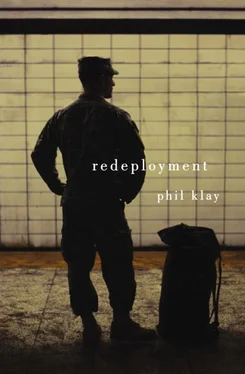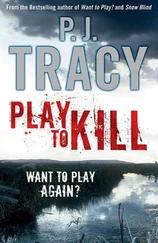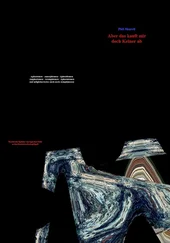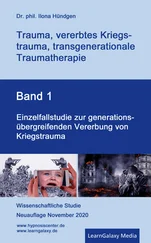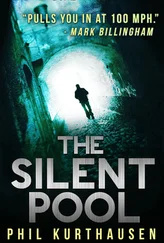Sergeant Deetz lets out a long breath. It’s quiet for a second. Then he shakes his head and starts laughing. “Yeah, well, all of us except you,” he says.
When we get out of the chow hall, I don’t know what to do with myself. We don’t have anything planned until evening, when we have another illum mission, so most of the guys want to hit the racks. But I don’t want to sleep. I feel like I’m finally fully awake. This morning I’d gotten up boot-camp-style, off two hours of sleep, dressed and ready to kill before my brain had time to start working. But now, even though my body is tired, my mind is up and I want to keep it that way.
“Head back to the can?” I say to Jewett.
He nods and we start walking the perimeter of the Battle Square, shaded by the palm trees that grow along the road.
“I kind of wish we had some weed,” says Jewett.
“Okay,” I say.
“Just saying.”
I shake my head. We get to the corner of the Battle Square, Fallujah Surgical straight ahead of us, and turn right.
Jewett says, “Well, it’s something to tell my mom about, finally.”
“Yeah,” I say. “Something to tell Jessie about.”
“When’s the last time you talked to her?”
“Week and a half.”
Jewett doesn’t say anything to that. I look down at my wedding band. Jessie and I’d gotten a courthouse wedding a week before I deployed so that if I died, Jessie’d get benefits. It doesn’t feel like I’m married.
“What am I supposed to tell her?” I say.
Jewett shrugs.
“She thinks I’m a badass. She thinks I’m in danger.”
“We get mortared from time to time.”
I give Jewett a flat look.
“It’s something,” he says. “Anyway, now you can say you got some bad guys.”
“Maybe.” I look at my watch. “It’s zero four, her time. I’ll have to wait before I can tell her what a hero I am.”
“That’s what I tell my mom every day.”
When we get near the cans, I tell Jewett I left something at the gun line and peel off.
The gun line’s a two-minute walk. As I get closer, the palm trees thin out into desert, and I can see the Camp Fallujah post office. Here the sky expands to the edge of the horizon. It’s perfectly blue and cloudless, as it has been every day for the last two months. I can see the guns pointing up into the air. Only Guns Two and Three are manned, and their Marines are just sitting around. When I got here this morning, all the guns were manned and everybody was frantic. The sky was black, with just a touch of red bleeding in from the rim of the horizon. In the half-light, you could see the outline of the massive, forty-feet-long, dark steel barrels pointed into the dark morning sky and below them the shapes of Marines hustling about, checking the guns, the rounds, the powder.
In the daylight, the guns shine crisp in the sun, but earlier this morning was dark and dirty. Me and Bolander and Jewett stood in the back right, waiting by the ammo, while Sanchez called out the quadrant and deflection they were giving to Gun Three.
I had put my hands on one of our rounds, the first one we sent out. Also the first I’d ever fired at human targets. I’d wanted to lift it up right then and there, feel the heft of it tug on my shoulders. I had trained to load those rounds. Trained so much that I had scars on my hands from when they had slammed on my fingers or torn my skin.
Then Gun Three had fired two targeting rounds. Then: “Fire mission. Battery. Two rounds.” Then Sanchez had called out the quadrant and deflection and Sergeant Deetz had repeated it and Dupont and Coleman, our gunner and A-gunner, had repeated it and set it and checked it and had Sergeant Deetz check it and Sanchez verify, and we got round and time and Jackson had gotten powder and we moved smooth, like we trained to, me and Jewett on either side of the stretcher holding the round, Bolander behind with the ramming rod. Sergeant Deetz checked the powder and read, “Three, four, five, white bag.” Then, to Sanchez: “Charge five, white bag.” Verified.
We moved in with the round, up to the open hatch, and Bolander shoved it in with the ramming rod until we heard it ring, and Voorstadt closed the hatch.
Sanchez said, “Hook up.”
Deetz said, “Hook up.”
Voorstadt hooked the lanyard to the trigger. I’d seen him do it a thousand times.
Sanchez said, “Stand by.”
Deetz said, “Stand by.”
Voorstadt pulled out the slack in the lanyard, holding it against his waist.
Sanchez said, “Fire.”
Deetz said, “Fire.”
Voorstadt did a left face and our gun was alive.
The sound of it hit us, vibrating through our bodies, down deep in our chests and in our guts and in the back of our teeth. I could taste the gunpowder in the air. As the guns fired, the barrels shot back like pistons and reseated, the force of each round going off kicking up smoke and dust into the air. When I looked down the line, I couldn’t see six guns. I just saw fires through the haze, or not even fires, just flashes of red in the dust and the cordite. And I could feel the roar of each gun, not just ours, as it fired. And I thought, God, this is why I’m glad I’m an artilleryman.
Because what’s a grunt with an M16 shooting? 5.56? Even the .50-cal., what can you really do with that? Or the main gun of a tank. Your range is what? A mile or two? And you can kill what? A small house? An armored vehicle? Wherever we were dropping these rounds, somewhere six miles south of us, those rounds were striking harder than anything else in ground warfare. Each shell weighs 130 pounds, a casing filled with eighty-eight bomblets that scatter over the target area. Each bomblet has a shaped explosive charge that can penetrate two inches of solid steel and send shrapnel flying over the battlefield. Putting those rounds downrange takes nine men moving in perfect unison. It takes an FDC, and a good spotter, and math and physics and art and skill and experience. And though I only loaded, maybe I was only one-third of the ammo team, but I moved perfectly, and the round went in with that satisfying ring, and the round went off with that incredible roar, and it shot out into the sky and hit six miles south of us. The target area. And wherever we hit, everything within a hundred yards, everything within a circle with a radius as long as a football field, everything died.
Voorstadt had the lanyard unhooked and the breech open before the gun had fully reseated, and he washed the bore with the chamber swab and we loaded another round, the second I had fired at a human target that day, although by this point, surely, there were no more living targets. And we fired again, and we felt it in our bones, and we saw the fireball burst from the barrel, and more dust and cordite went into the air, choking us with the sand of the Iraqi desert.
And then it was done.
Smoke surrounded us. We couldn’t see beyond our position. I was breathing hard, taking in the smell and taste of gunpowder. And I’d looked at our gun, standing above us, quiet, massive, and felt a kind of love for it.
But the dust began to settle. And a wind came and started picking at the smoke, tugging it and lifting it over us, then higher, into the sky, the only cloud I’d seen in two months. And then the cloud thinned, disappearing into the air, blending with the soft red Iraqi sunrise.
Now, standing before the guns with the sky a perfect blue and the barrels piercing up into the air, it doesn’t seem as though any of it could have happened. No speck of this morning remains in our gun. Sergeant Deetz made us clean it after the mission was over. A ritual, of sorts, for our first kill as Gun Six. We’d taken apart the ramming rod and the cleaning swab, attached the two poles together, along with a bore brush, and drenched the brush in CLP. Then we’d all stood in line behind the gun, holding the pole, and in unison had rammed it through the bore. And then we’d repeated the process, and black streaks of CLP and carbon snaked down the pole, staining our hands. We’d kept at it until our gun was clean.
Читать дальше
